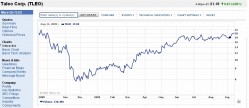![]() Did somebody forget to tell Taleo we’re in a recession?
Did somebody forget to tell Taleo we’re in a recession?
The Dublin, California-based company has been on a tear this year, tripling its stock price as it declared itself officially on a shopping spree. As if to prove it isn’t just blowing smoke, Taleo, Tuesday, spent $16 million buying its strategic partner Worldwide Compensation Inc., which sells global compensation planning solutions.
The deal was announced in Las Vegas at the annual TaleoWORLD user conference, where the company also unveiled Taleo 10, the newest iteration of its integrated talent management platform. Taleo unabashedly describes its new platform as “the fastest, most social, and mobile talent management system on the planet.”
It’s a major play for Taleo, giving it a product with which it can correctly claim it has an end-to-end solution.
The new Taleo 10 incorporates some of what was missing in earlier platforms, particularly a development module the company, appropriately enough, calls Taleo Development. It is planning oriented, including classic succession and personal development planning tools as well as what Taleo calls “social learning,” which is a form of internal networking.
It works with learning management systems, but Taleo, through a partnership it announced Wednesday at TaleoWORLD, is connecting Development to Learn.com. The integration will allow Taleo Development to link directly to Learn’s training courses.
Taleo 10 has one of the tightest Outlook integrations on the market, making it possible for recruiters and managers to access candidate information and even do performance reviews right from Outlook. Its still-to-come mobile uses, via Blackberrys and iPhones, will make it possible for candidates to browse jobs, apply, and even track their status.
All of that, and the other features and enhancements in Taleo 10 (Taleo says there 100-plus new ones in recruiting alone) alone would make it worth a look, but the Talent Grid piece shows the company has been paying attention to the market and figuring out how to leverage its already substantial presence.
Taking a cue from the talent network AllianceQ, Taleo has developed Talent Exchange where candidates and Taleo customers can share job openings and resumes, which the Grid calls Universal Profiles. The potential is up to 13 million candidates a quarter and as many as 500,000 jobs, should all 4,100 Taleo customers participate.
There’s also a knowledge base, built around a social network, and an iPhone-like applications store of ready-to-use products and services from Taleo, its partners, and customers. All of that handy and undoubtedly useful stuff, but the Talent Exchange may be the most valuable as companies begin hiring again.
Josh Bersin, in his overview of Taleo 10, calls its release “a very important announcement for the HR software industry.”
Buying Worldwide Compensation now enables Taleo to offer a performance management solution that directly integrates with compensation planning. The company has historically been strong in recruitment. Its roots, after all, are in talent procurement, having started life in Canada as a job board, before moving to the U.S. and introducing an ATS.
In the last several years Taleo has moved aggressively toward a complete lifecycle solution, and toward growing its market share. Acquiring Vurv in 2008 achieved both objectives. Vurv had a strong talent management platform and 1,700 customers.

The expansion of pay-for-performance compensation was already well underway before the recession took hold, and if anything it has made companies look ever more carefully at how they dole out raises and bonuses. Having a comp management component can only strengthen Taleo’s position in that area, a goal that was clearly on the mind of company CEO Michael Gregoire when he discussed the acquisition with a Reuters reporter.
“In the performance management market we are relatively nascent and have less than 1 percent market. We would like to see ourselves (increasing the share) to mid to high single digits over the next couple of years,” Reuters quotes Gregoire as saying.
Worldwide can accurately be described as a leader in the compensation planning field. Gartner positioned Worldwide in its Performance Management Magic Quadrant, recognizing the firm’s “Best-in-Class Global Compensation Functionality, and Deep Global Compensation Expertise.”
Gregoire foreshadowed the acquisition — and probably others — in an interview with the Oakland Tribune in August. He told the paper Taleo might spend as much as $50 million to buy companies with the technology it wants. It has $62 million in cash to shop and could, the paper reported, go to the equity markets to raise more if it needed to.
It’s a long way from the dark days of last November when the company had nothing but bad news to report. It’s third quarter financials released at the beginning of the month showed an $8.2 million loss. That was followed in rapid succession by a notice that its financial filings would be delayed pending an audit of its income recognition practices. Over the next few weeks it was hit with class action lawsuits over its accounting practices and its financial disclosures.

On Nov. 4th, the day after the financials were released, the stock closed at $14.94. The loss, though sizable, was explained by costs associated with the Vurv acquisition. By Dec. 1 Taleo was trading at $5.69.
The company has since come current with its filings with the Securities and Exchange Commission and resolved its accounting problems with an $18 million adjustment. It’s still facing three shareholder class action suits. A hearing on the company’s motion to dismiss it is schedules for Nov. 13th. Another lawsuit over patents is being waged with Kenexa.
Financially, the Vurv acquisition continues to be a drain. Most of the $2 million Taleo lost in the first six months of the year is due to costs associated with Vurv. But the $100k profit it eeked out in the 2nd quarter is a hopeful sign that the worst may be behind.
Yahoo Finance says Wall Street analysts are expecting Taleo to earn 16 cents per share on $49 million in revenue for the current quarter, which ends Sept. 30. Since the beginning of the year, Taleo’s stock has been upgraded by several of the firms that follow the company with the consensus leaning toward it being a “buy.”